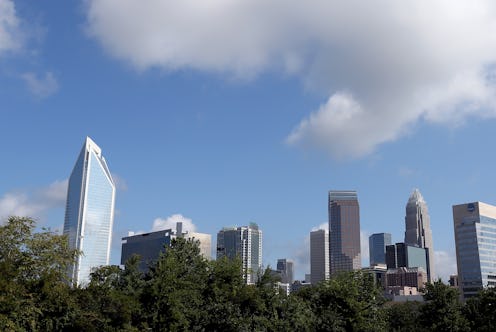News
North Carolina Was Sued Over Its Terrible New Law
Following days of controversy over the passing of House Bill 2, North Carolina was sued in federal court early Monday morning to block the bill, which overrides local LGBT-inclusive nondiscrimination policies and limits transgender individuals' use of public restrooms. "By singling out LGBT people for disfavored treatment and explicitly writing discrimination against transgender people into state law, H.B. 2 violates the most basic guarantees of equal treatment and the U.S. Constitution," the lawsuit argues.
Three North Carolinians brought the case forward along with the ACLU of North Carolina and Equality North Carolina, an LGBT rights group. The national ACLU and Lambda Legal are also backing the case. The three named plaintiffs are employees at public universities. As a part of the law, transgender individuals would not be allowed to use bathrooms in public facilities (including those at universities) that correspond to their gender identity and presentation — they would be forced to use the bathroom that matches what's written on their birth certificates.
The law also repealed local nondiscrimination ordinances that protect LGBT residents. Charlotte, the state's biggest city, passed a comprehensive nondiscrimination ordinance that was set to come into effect Friday, April 1. The legislature's Republican leaders spent $42,000 on a special session last Wednesday to fast-track H.B. 2 so that it could block the ordinance before it came into effect. Charlotte's ordinance provided far-ranging public accommodations protections and would have let trans residents use the bathroom of their choice.
The lawsuit argues that the law violates people’s equal protection, privacy, and liberty rights under the 14th Amendment of the U.S. Constitution. It alleges that "H.B. 2 was motivated by an intent to treat LGBT people differently, and worse, than other people, including by stripping them of the protections afforded by the City of Charlotte’s Ordinance and precluding any local government from taking action to protect LGBT people against discrimination."
The lawsuit alleges that the anti-trans bathroom provision also violates the constitution. It uses the example of one of its plaintiffs, Joaquín Carcaño, a transgender man who works at the University of North Carolina-Chapel Hill. All the restrooms where he works on campus are designated for either men or women. There are no single-stall bathrooms. If he were not allowed to use the men's room, then he would have to leave campus, search for a single-stall bathroom, or go to a local business. The lawsuit argues that this violates the constitution: "H.B. 2’s discrimination against transgender people based on sex is not substantially related to any important government interest. Indeed, it is not even rationally related to any legitimate government interest."
Specifically in regards to the anti-trans bathroom provision, it bases part of its argument on the violation of civil rights under Title IX of the Education Act of 1972. The lawsuit argues that the bill discriminates in educational programs and activities "on the basis of sex," which would be in violation of the law. The Obama administration and federal agencies have considered discrimination based on gender identity a form of sex discrimination, and have kept school districts around the country from putting similar anti-trans bathroom rules in place.
This lawsuit could take time to wind its way through the court system. The plaintiffs have asked for an injunction, which could potentially let Charlotte's nondiscrimination ordinance stand while it does so.
